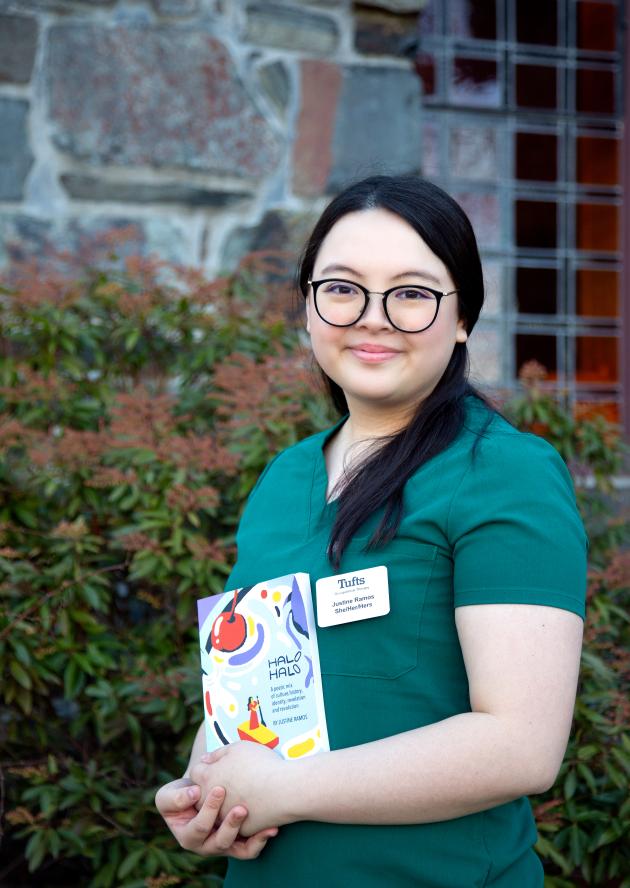Combining Creativity and Care

By: Maisie O'Brien
As a poet, Justine Ramos, OTD ‘24, is used to exploring complex emotions, personal histories, and innovative ideas. At Tufts, she is applying her creative skillset to the field of occupational therapy (OT) where she is pursuing an Entry-Level Doctorate in Occupational Therapy focused on acute rehabilitation and mental health.
Ramos grew up in a large, intergenerational household and was first introduced to the field of OT when her grandmother was receiving OT and other home health services. She was struck by the positive impact OT can make in patients’ lives and attended Santa Monica Community College, then the University of California Los Angeles (UCLA), with the goal of becoming an occupational therapist.
Slam poetry was Ramos’ first love. She competed in slam poetry events throughout high school and college, and founded a slam poetry club at UCLA. She worked as a coach and judge with Get Lit/Words Ignite, a Los Angeles-based nonprofit providing an outlet for students to find their voice and community through poetry and performance.
In 2021, Ramos published her first book entitled Halo, Halo: a Poetic Mix of Culture, History, Identity, Revelation, and Revolution, which explores topics related to her Filipino-American identity, including themes of identity, history, and social justice.
“The title ‘Halo-Halo’ translates to ‘mix-mix’ and is the name of a traditional, colorful Filipino dessert,” explains Ramos. “It’s made of shaved ice milk and contains multiple layers and ingredients. I used this as a metaphor for Filipino identity itself, which is a mix of a lot of cultures due to years of colonization and imperialism. Add to that being Filipino-American and our identities can be complicated, so this dessert signifies these random components that don’t seem like they should go together, but somehow come out beautiful and amazing in the end.”
Ramos has found ways to channel her passion for writing and connecting people through art to the field of OT. While working as an OT aide, she led a poetry workshop for students who had endured a traumatic brain injury, a condition which can result in challenges managing emotions and communicating with others.
“I made the workshop adaptable for them,” says Ramos. “Some of the participants couldn’t write or create sentences, so I used poetry magnets, so they could pick and choose words and put them together in ways that were meaningful to them. And they were able to communicate what they were going through with me and their loved ones. I’ve always felt that poetry is like a gateway to understanding, not just for the person writing it to understand themselves, but for other people to understand them as well.”
At Tufts, Ramos has participated in a host of fieldwork placements that have exposed her to various branches of OT. She worked at an independent living facility for seniors living with dementia where she co-founded a crafts group called Creativi-Tea. She joined a lab at Brigham and Women’s Hospital researching postpartum depression and psychosis among women of color. And she participated in a service learning program at a local school, where she implemented a mindfulness corner where students are encouraged to do yoga and breathing exercises, and use sensory tools to help regulate their emotions.
“Starting from your first semester at Tufts, you’re put into service learning placements where you volunteer to put your OT education to use in new contexts,” says Ramos. “It’s a wonderful way to learn more about the field and the many different populations and settings where OT can be impactful.”
Ramos has drawn inspiration from many of her OT professors, whom she credits with helping her to become a more empathetic, knowledgeable, and strategic practitioner. “There are so many great professors at Tufts,” she says. “I've really thrived in classes taught by Sarah Skeels in particular. She brings her background in disability studies and her lived experiences to teach us not only how to be better occupational therapists but better people.”
This summer, Ramos is interning at a physical medicine facility in Southern California, supporting clients who have experienced spinal cord injuries. Next fall, she will be working at an inpatient mental health facility in Maryland, supporting clients who are living with severe mental illness. After graduation, she hopes to complete a fellowship in either mental health or acute rehabilitation, and then work as a traveling occupational therapist. After an exceedingly busy few years, Ramos hopes to carve out more time to write and get started on her next book.